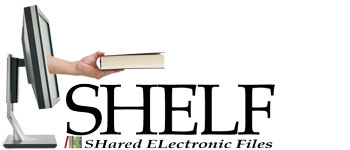Which libraries are currently participating in the SHELF Project?
- Perkins Talking Book and Braille Library
- Utah Library for the Blind
- Idaho Talking Book Library
- Colorado Talking Book Library
- Wolfner Library for the Blind and Physically Handicapped (Missouri)
- Vermont Department of Libraries, Special Services Unit
- Maryland State Library for the Blind and Physically Handicapped
- Braille Institute of America (California)
How do files get transferred to the SHELF Project?
We see it happening in two steps. For most libraries, they have some number of existing titles that need to be transferred, and then will have an ongoing need to transfer titles as their recording program completes them.
The first step is to transfer a batch of titles. For that, we see it being better to send them on media. Transferring them over FTP is certainly an option, but it is likely going to take longer, will tie up network bandwidth, and require more hand-holding than it is worth. We will send you an external drive that connects via USB. You then load the completed DTBs onto the drive and send it to us. Once we receive it back from you, we will load the recordings into our back-end storage, and link the files to the appropriate titles. In order for us to automatically link the recordings to the proper titles, the KlasID needs to appear in the filename (our naming convention follows the standard established by NLS for BARD.)
The second stop is to transfer recordings as your recording program completes them. For this, transferring them over FTP is probably the best option, unless there is a larger number of recordings or some technical difficulty in transmitting the files to us.
Will we be able to submit our recorded magazines?
We do expect to support magazines in the future, but the initial focus is on books.
How will my patrons be able to find and download titles?
We expect that your patrons to search your local catalog to locate titles that are part of the SHELF project. One of our major goals is to put more focus on your catalog-- not detract from it by asking your readers to use different sites for different purposes.
For libraries that do not have an on-line catalog, libraries whose catalog cannot provide a download link for titles, or libraries that choose not to load the titles into their automation system, we also offer an online catalog to search the SHELF Project's collection.
Why does the SHELF Project need information about my readers?
We only need to have basic information about your readers-- nothing more personally identifiable than their name, their ID number in your automation system, and their a password for them to use. This information is needed for 2 purposes:
- To track downloads. In order for the SHELF Project to be able to send 'HasHad' information back to you, we have to be able to know who requested the recording.
- To provide security. In order to protect the accuracy of the statistics, and ensure that only authorized users can download recordings, the reader must log in with their ID and password before they may download anything.
How will the logins work?
For libraries already using KLAS, the reader information will seamlessly be integrated. As soon as you enter or update a reader's record, that information will be sent to the SHELF Project. The patron's experience is very simple and streamlined. The reader will login to your local WebOPAC, and that login credential will be passed to the SHELF Project's server whenever they request a download. They will not need to login a second time.
For libraries that are not using KLAS as their automation system, the SHELF project will need to be sent updates as you maintain your readers. This is probably most easily done by sending a copy of your CMLS transactions. The user experience may also not be quite as streamlined as it is with KLAS. Unless your automation system can implement the web services calls to pass the login credentials behind the scenes, the user will be asked to login to the SHELF Project once they have requested a download.
How many users can be using the SHELF Project at the same time?
There is no limit on the number of people who can be searching the catalog, or downloading recordings. We have substantial, but not unlimited network bandwidth to support the downloads. As a result, if many users are downloading recordings simultaneously, they may see reduced download speed. A user should not be denied access to download due to demand or the number of concurrent users. We will be monitoring the bandwidth usage, and increasing it as necessary.
How can a participating library provide ILL access to their titles to other libraries?
We will provide all regional libraries with a login to access the SHELF Project's on-line catalog. From here, libraries can download copies for their ILL needs. This will allow usage statistics to be reported to the originating library.
For libraries using KLAS:
Is there anything special that I have to do in order to keep my records synchronized?
No, KLAS has built in integration. This allows reader information to automatically be submitted to the SHELF Project's database whenever you add or update a record. The same integration allows HasHad information to be updated immediately when they request a download. For libraries not using KLAS, the transactions will be sent to you monthly in the same format that NLS uses to send BARD transactions.
Is the SHELF Project related to the "New WebOPAC" that I've been hearing about??
No. The SHELF Project will work with the current version of KLAS WebOPAC, as well as with the upcoming release of the "new WebOPAC".



